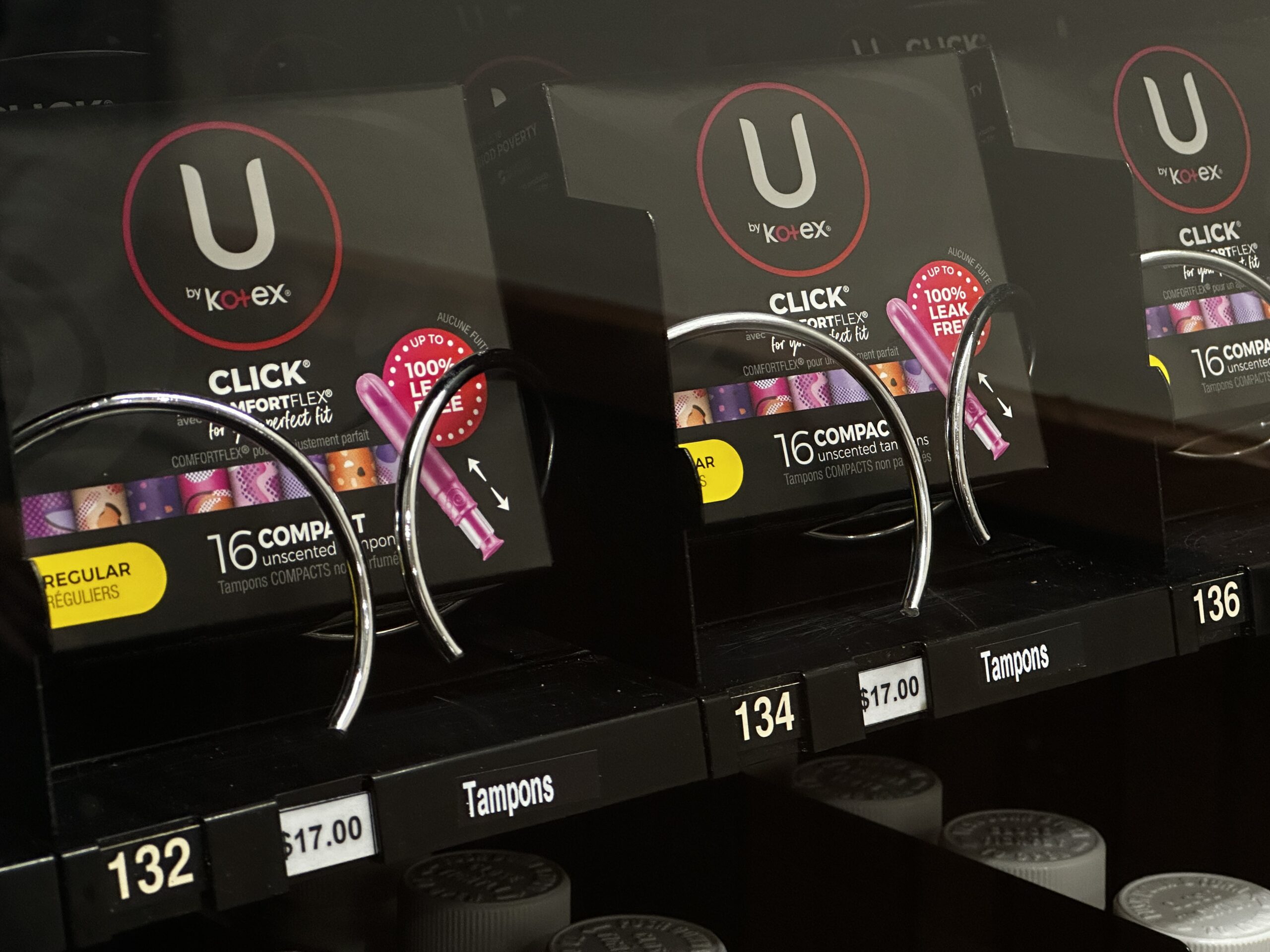The new healthcare vending machine features items such as COVID-19 tests, emergency contraception and menstrual products. Photo by Haley Morkert.
ALLIE MCKIBBEN | STAFF REPORTER | amckibben@butler.edu
Butler’s first-ever healthcare vending machine has found its home in Atherton Union. Located in the south stairwell between the first and second floor, the machine offers several essential items which are now available on campus at all hours of the day since Jan. 4. These include emergency contraception, condoms, tampons, COVID-19 tests and over-the-counter medicines.
The vending machine was made possible after years of discussions between various groups at Butler, such as the Student Government Association, the Sexual Assault Response and Prevention office, Butler Health Services and BUBeWell. The director of Health Services, Maxie Gardner, led the vending machine initiative.
Junior journalism major Abby Fostveit said the vending machine is a valuable resource for her since she does not have easy access to off-campus transportation.
“I, personally, don’t have a car on campus … so I think the vending machine is really convenient, since I don’t have to ask a friend for a ride, or, if I need something, I don’t have to find a way to get off campus,” Fostveit said.
Even when students do have means of transportation, they now have the convenience to access healthcare products without leaving Butler. Emma Maaske, a junior speech, language and hearing sciences major, said that although she mainly buys her healthcare products elsewhere, she would consider using the vending machine due to its convenient location.
“I usually get [healthcare products] from a pharmacy, whether that’s CVS or Walgreens, either one, that’s where I usually go,” Maaske said. “… Because of the new healthcare vending machine … If I don’t have … access to go off campus, or … if I’m in a time crunch … I could definitely see myself using the vending machine.”
Butler’s new vending machine follows the implementation of similar machines on other college campuses, such as Purdue University and Stanford University. Katherine Wood, assistant director for Butler health promotion & wellness, said the vending machine is part of Butler’s initiative to promote the accessibility of vital supplies for students at any point in time.
“The goal is to provide greater access to a variety of healthcare products that someone might need,” Wood said. “We’re continuing to prioritize our campus health, safety and well-being through this new offering, which was intentionally placed in a central, accessible location.”
Fostveit, a member of the cross country team, said one of the items she is excited to have easy access to is COVID-19 tests, which help minimize the spread of sickness among athletes.
“As a student athlete, one of the things that we really want to make sure happens is that if one of us is sick, we don’t want to infect everyone [on the team],” Fostveit said. “ … I think it’s really awesome that there’s COVID tests in there because it’s a lot easier to get a COVID test as quickly [as possible] then report the results back to my coach as fast as I can.”
The vending machine prices vary. Some items are cheaper than drugstore prices, such as emergency contraception. The healthcare vending machine offers emergency contraception for $14, which is cheaper than both how much Plan B and the generic pill, Aftera, are sold for at CVS. However, prices for items, such as COVID-19 tests and tampons, are higher than standard retail prices.
Fostveit had some concerns about the pricing of the COVID-19 tests.
“I am curious on why the prices are the way that they are because I know that Target sells some for, like, 10 bucks as opposed to 22,” Fostveit said.
Along with COVID-19 tests, the price of tampons in the vending machine is $17 while the same brand and count of tampons can be found at CVS for $6.49. Maaske stated that since feminine products and condoms can be found in public spaces, they should not cost anything.
“I feel like pads, tampons, condoms — that type of stuff should be free,” Maaske said. “… Like I said, you could get that from any bathroom. Most public bathrooms have at least pads or tampons.”
Both Maaske and Fostveit said that they believe another vending machine should be positioned closer to AV, and the vending machines should have a greater variety of supplies as well. Maaske stated that she would like to see antacids and over-the-counter medications, and Fostveit said she would like to see bandaids in the machine.
Any other questions about the healthcare vending machine can be directed to Scott Peden, executive director of student well-being.



